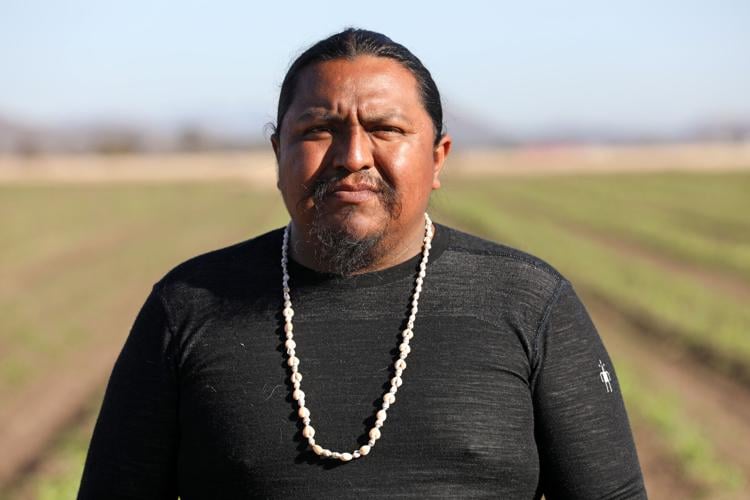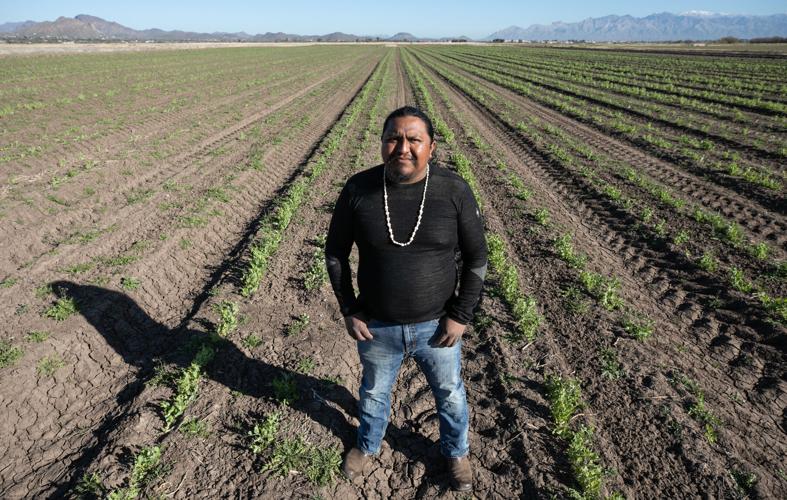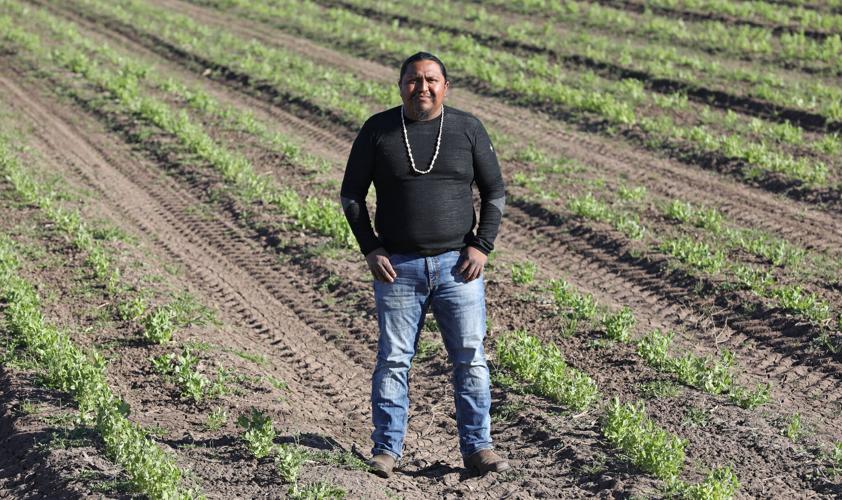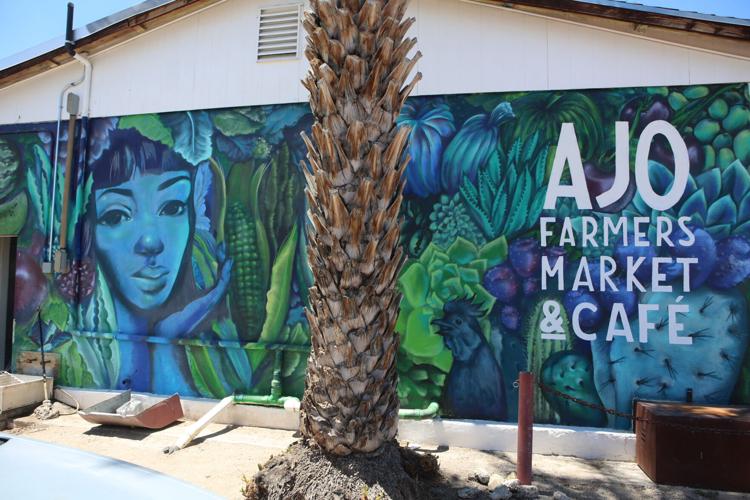Before Ajo CSA, Sterling Johnson was a cowboy. His life was in the dusty arena of the rodeo, holding onto the back of a bull as long as he could. For over 25 years, he raced wild horses and worked with cattle, until an injury halted his professional career.
“Rodeo doesn’t pay you for participation,” Sterling said. “It pays you to win.”
To pay his bills, Sterling joined an apprenticeship program at Ajo Center for Sustainable Agriculture (CSA). The nonprofit teaches people in west Pima County and on the Tohono O’odham Nation traditional and nontraditional agricultural practices. It also connects the community with resources like a food pantry filled with organic, local and Indigenous produce. As an apprentice, Sterling learned how to grow foods he had only ever seen in a supermarket.
“All I knew how to grow were traditional foods: tepary beans, corn, squash,” Sterling said. “Now, [I grow] all these different varieties. By 2017, I was growing 70 varieties of plants in the gardens. Everything from heirloom pomegranates, figs, to discovering new traditional foods and planting them as well as everything else, kale, broccoli.”
Today, he is Ajo CSA’s co-director, a position he stepped into last year.
Before Ajo CSA, Sterling Johnson was a child in the schools on the Tohono O’odham Nation. If he had been born earlier, the federal government would have forced him to go to a boarding school. His education was still impacted by that violent cleft: he was not taught how to grow foods in the arid desert, as his ancestors did. If he hadn’t taught himself, he wouldn’t have been able to, in turn, teach the schoolchildren at Tohono O’odham High School. They might not be learning those techniques today.
“Our traditional foods were almost lost,” Sterling said.

Sterling Johnson stands in a crop field at San Xavier Farms on Feb. 24, 2023.
“That’s the big thing about Sterling,” Nina Sajovec said, his co-director at Ajo CSA and life partner. “Yes, he’s a farmer/educator, yes he’s a community organizer, yes he’s a mentor. He’s [also] one of the few on the reservation who know about traditional dryland farming. There might be one other person doing it the old, old way. The Tohono O’odham lost that way.”
Tohono O’odham dryland farming — called Ak-Chin farming, or “the mouth of the wash” — captures flood water with ridges (called berms) that stop and hold the water and gradations (called contours) that direct the gravitational flow of the water.
“Sterling is revitalizing these methods that were lost by three generations of boarding schools and other colonial structures. He’s one of the rare people who are doing this. Hopi have their own way of dryland farming, so he’s also part of this Indigenous network in both farming leaders as well as nonprofit leaders,” Nina said.
Though Ak-Chin farming is more sustainable — it does not rely on water from the Colorado River — and can be paired with native, drought-resistant crops like tepary beans, Sterling said that these methods cannot overcome a changing climate alone.
“There is a limitation for what traditional foods can do,” Sterling said. “I’ve watched our traditional squash in 2020 suffer and not be able to reproduce any seeds for us … The traditional squash takes longer to ripen. It was an arid place. In 2020 there was no rain, there was no monsoon season. That long, lingering heat and no clouds and rain. That squash suffered. Every plant has its limitations.”

Sterling Johnson holds jars of brown and white tepary beans grown in Ajo.
Before Sterling became co-director last summer, he worked as the farm manager, leading and teaching the apprentices. His work extended beyond the fields.
He has worked in the desert and online to lead ciolim (cholla bud) harvesting workshops. He has worked at elementary and high schools on the Tohono O’odham reservation to develop community gardens with students. He has worked at the Tohono O’odham Community College to facilitate a working group of farmers.
He has worked in Tucson, at Mission Garden, to lead workshops on how to grow traditional wheat and corn. He has worked in Phoenix, advocating for legislation to fund farm apprentice programs. He has worked in Sells and across the Nation to organize farmers and artisans for the Tohono O’odham Farmers Market. In his new role, he’s mentoring others to take over those responsibilities so Ajo CSA can grow.
Nina described her partner in work and life as a “great listener, compassionate, and extremely hardworking. He can go for 14 hours and keep on going,” she said.
“He also speaks of living in two worlds,” Nina continued. “He was born and raised in a very traditional family, with very traditional values, and he understands the outside world, as he calls it, and [tries] to be firmly rooted in both of them — not giving up all his traditions but also not giving up living in modern times and the whole movement forward, using the best of both worlds.”
As Sterling continues to move into his role as co-director, he will be taking over operations on the reservation while Nina will work behind the scenes with financial reports and grant writing. “Sterling is more in the front, working with managers of operations, staff development and implementing the grants,” she said.
Nina is sensitive that there is a spotlight on Ajo CSA as one of very few Indigenous-run nonprofits in not just Arizona, but the country. “We are creating a model,” she said. “We know people are watching.”
“We want to move past tokenism,” Nina said. “We’re thinking really hard, how can we share our best practices and help others too? If an organization from the outset, an organization wants to work with Tohono O’odham — do Tohono O’odham really need you? Or do you just want to write a grant?
“In order to do that we need to heavily invest in Native American leaders. For us it starts with preschool,” Nina said. “To show Native kids, you can be here. Sterling is one of the people leading the way.”
“I’m doing whatever I can to teach the next generation. Going from farm manager to co-director, I’m taking a step back and letting the next generation take over … I’ll still be there for guidance but as I ascend into a new position, I’m no longer on the ground as much. But I oversee traditional foods,” Sterling said.
“I haven’t left completely,” he said. “I’m a farmer at heart.”
By the numbers
Free meals provided by Ajo CSA to their community every month: 2,000
Crops cultivated by Ajo CSA: 70
Indigenous vendors at the Tohono O’odham Farmers Market: 50
Percent of vendors who are Indigenous at the Tohono O’odham Farmers Market: 100
Years Ajo CSA has been Native-governed: 5

Ajo Farmers Market and Cafe is located at 100 W. Estrella Ave. in Ajo.
How to connect with Ajo CSA
Kaij Ki
“We have an office space here in Sells where we have traditional seeds available for the community and for the Nation. We call it Kaij Ki, suite 209, so that’s where people can come in, and have traditional foods available, cornmeal, Sonoran white wheat, tepary beans, Indigenous coffee, cholla buds, and the cookbook,” Sterling said. “We really have a lot of things available for people."
Location: Tohono Plaza, 1 Indian Rte. 19, Suite 209, Sells, AZ
Hours: 9 a.m. to 2 p.m. Thursday-Friday
For more information, check out Ajo CSA’s Facebook page.
Tohono O’odham Farmers Market
Location: Sells District Office, State Route 86 Mile Post 112, 7, Sells, AZ
Hours: First and second Fridays of the month; on April 7 and April 14 at 3-6 p.m.
For more information, check out their Facebook page.
Mission Garden
Location: 946 W. Mission Lane
When to find Ajo CSA: 8 a.m. to noon every third Saturday
For more information, check out their website.
Ajo Cafe & Farmers Market
Location: 100 W. Estrella Ave., Ajo, AZ
Hours: 10 a.m. to 2 p.m. Monday-Friday
For more information, check out their website.
Other locations of the Ajo food pantry can be found here.
To find out more about workshops online and in-person, follow Ajo CSA on Facebook.

Great food and drinks start with great water
Restaurants, breweries and coffee shops know that clean, pure water is crucial. You can get that at home too with Kinetico Quality Water. Kinetico removes more contaminants than any other system. Get up to $500 off a non-electric, high efficiency patented Kinetico system (restrictions apply). Visit KineticoTucson.com.
What does "supported by" mean? Click here to learn more.










